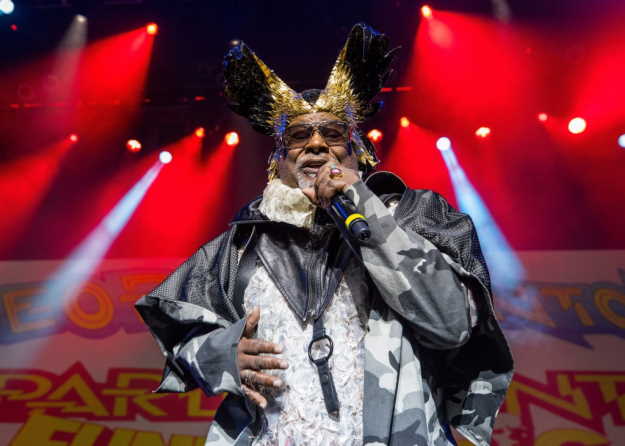| |
Taken from The Dispatch (Jul 03, 2021)
Celebrating Independence Day with Parliament-Funkadelic
This year, a different Founding Father deserves our attention.
by Guy Denton

George Clinton. (Photo by Scott Legato/Getty Images) |
The Fourth of July is a celebration not only of freedom, but of everything that distinguishes the United States: its exhilarating history, spectacular geography, and vibrant culture. The latter aspect may seem incongruous. After all, it is often sneeringly said that America has no culture. Though that notion is ridiculous for countless reasons, one particularly resonates. America is the only nation on earth where a style of music can be converted into epic mythology.
In the 1970s, George Clinton did precisely that with the creation of Parliament-Funkadelic. If James Brown was the king of funk, Clinton is its high priest, proselytizing the gospel of good times to generations of disciples. Fueled by psychedelics and backed by a sprawling collective of musicians, Clinton merged the frenetic dance hooks Brown had pioneered with the honeyed soul of Motown, raw power of rock, and bizarre imagery of comic book sci-fi. In turn, he established "P-Funk" as something culturally unprecedented; a musical genre that doubled as a philosophy.
For Clinton devotees, funk is both a cosmic force and a way of life. It can heal painful ailments-most notably arthritis, rheumatism, or migraines-bring forth spiritual enlightenment, and empower the disenfranchised. To be funky is to be free, liberated both from the psychological restrictions with which we often burden ourselves and the social or physical restrictions that may be placed on us by others. "How's your funkentelechy?" Clinton queried his listeners on perhaps Parliament's greatest recording, expanding the ancient concept of entelechy that referred in part to the realization of human potential. Funk, the song notes, "is responsive to your mood. You can score it any day on WEFUNK."
WEFUNK, in Clinton's madcap folklore, is an extraterrestrial radio station that transmits concentrated P-Funk throughout the universe. Broadcasting under the direction of Star Child and Dr. Funkenstein, it serves as a bulwark against the villainous Sir Nose D'Voidoffunk, who seeks to deprive mankind of funk's ineffable joy by infecting them with the Placebo Syndrome. Ultimately, to resist Sir Nose's fatal allure, all you have to do is dance.
On Chocolate City (1975), Parliament's third album, Clinton presented a grand vision of black emancipation. The title track describes a presidential administration staffed by Muhammad Ali, Richard Pryor, and Stevie Wonder, and a Washington, D.C., undergoing a musical revitalization in the wake of the battle for civil rights. Its followup, Mothership Connection (1975), was a work of exuberant Afrofuturism that elevated black Americans to an even higher plane of representation. "Once we did Chocolate City-putting black people in situations they have never been in, and it worked-I knew I had to find another place for black people to be," Clinton said. "And space was that place." In its depiction of black interstellar travelers and galactic superheroes, the album defied prejudices of the moment, providing a source of cosmic inspiration to millions.
Though Clinton's work was inescapably political, it transcended tribal partisanship. Funkadelic's later albums, most notably One Nation Under a Groove (1978) and Uncle Jam Wants You (1979), called upon all individuals to unite beneath the singular banner of funk. Through collectively forgetting their trivial differences and pledging their groovallegiance to the music, Americans could fulfill the promise of the Declaration of Independence and lead the United States toward the full amplitude of its Founding. The lyrics to "One Nation Under a Groove" express this message with profound clarity:
"One nation under a groove/getting down just for the funk of it/One nation and we're on the move/nothing can stop us now."
This Fourth of July, Clinton's unparalleled creativity serves as a reminder of both how much America has achieved for itself and the wider world, and how much progress has yet to unfold in bringing about a more perfect union. It evokes not only the tragic aspects of American history and inequities that remain in American life, but all that the American people have overcome in the name of peace, liberty, and community. A commitment to the eternal principles recognized by the Founding Fathers has brought the United States to this point. Going forward, an additional commitment to the principles promulgated by the Founding Fathers of P-Funk could guarantee an ideally harmonious future, where "everything is on the one."
Indeed, P-Funk could only have emerged from the American consciousness. Scale is everything in the United States, and the extravagant nature of Clinton's live shows (which featured outlandish costumes, props, and call-and-response chants) ensured they were of equal proportion to cultural landmarks ranging from the Lincoln Memorial to Hollywood. Musically, Clinton and his peers fused a pop sensibility with psychedelic intensity, jazzy rhythms, and surreal, sexually-preoccupied humor. They created something that could seemingly exist exclusively in the realm of fantasy novels; a metaphysical aesthetic capable of entrancing anyone exposed to it.
To commemorate America's birth, we should look to the unique products of its national imagination. The eccentric world of P-Funk provides a musical backdrop and philosophical richness befitting of this rousing holiday. Now, as in 1976, funk is its own reward.
|
|